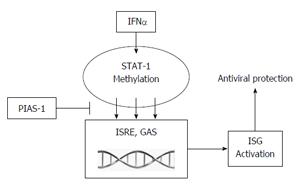©The Author(s) 2016.
World J Gastroenterol. Jul 21, 2016; 22(27): 6192-6200
Published online Jul 21, 2016. doi: 10.3748/wjg.v22.i27.6192
Published online Jul 21, 2016. doi: 10.3748/wjg.v22.i27.6192
Figure 1 Acetaldehyde suppresses interferon-α signaling in hepatitis C virus -infected liver cells by impairing signal transducers and activators of transcription 1 methylation.
The most downstream event in interferon (IFN)α signaling is the attachment of methylated STAT1 to DNA, interferon stimulated response element (ISRE) and gamma-interferon activated site (GAS), for activation of anti-viral interferon-stimulated genes (ISGs). Acetaldehyde suppresses STAT1 methylation, which facilitates increased STAT1 interaction with protein inhibitor of activated STAT 1 (PIAS1, a negative regulator of IFN signaling) preventing STAT1 binding to DNA. This ultimately results in reduced ISG activation and decreased induction of anti-viral proteins.
- Citation: Osna NA, Carter WG, Ganesan M, Kirpich IA, McClain CJ, Petersen DR, Shearn CT, Tomasi ML, Kharbanda KK. Aberrant post-translational protein modifications in the pathogenesis of alcohol-induced liver injury. World J Gastroenterol 2016; 22(27): 6192-6200
- URL: https://www.wjgnet.com/1007-9327/full/v22/i27/6192.htm
- DOI: https://dx.doi.org/10.3748/wjg.v22.i27.6192













